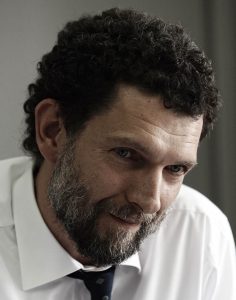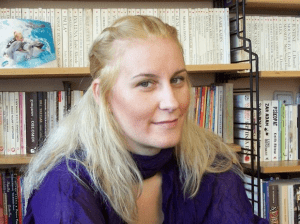15 Dec 2021 | Artistic Freedom, Events, Magazine, News and features, Turkey, Wales
Death threats targeting a playwright who has become the target of the Turkish government; self-censorship that messes with your thoughts and changes how a play is written – these were just two things that were discussed as part of the launch this week of the winter issue of Index on Censorship magazine, Playing With Fire: How theatre is resisting the oppressor. In this new issue, writers, playwrights and actors discuss how the world of theatre is facing and confronting censorship around the globe. As reflected in the magazine and at the event, which was held on Monday, the theatre world still has the strength to bring people together, despite censorship.
The launch event specifically focused on Turkey and featured a conversation between the playwright Meltem Arikan and the writer Kaya Genç. The conversation was led by Kate Maltby, critic, columnist, scholar and deputy chair of Index on Censorship’s Board of Trustees.
Arikan told the audience that her first experience of censorship dates back to 2004, when her novel Yeter Tenimi Acıtmayın (Stop Hurting my Flesh) was banned by the Committee to Protect Minors from Obscene Publications.
“I protested a lot and nobody joined me. Before my book was banned, people loved watching me on television. I was openly talking about women. Now I can see that censorship is a similar problem all around the world, not only in Turkey,” said the Turkish and Welsh author who was short-listed for the Freedom of Expression Award in 2014 by Index. Arikan’s play Mi Minor was accused by the Turkish authorities as provoking the Gezi Park protests in 2013. She says that after Mi Minor was performed, she received death and rape threats constantly: “If you are a woman they focus more on your gender.”

The production of Meltem Arikan’s Mi Minör play.
Censorship also restrains people’s ideas, almost like putting an ideological filter inside someone’s brain.
“Self-censorship affects the tone of your writing, including the adjectives you use. I started writing in English for Index, which gave me a great amount of liberty,” said Genç, a journalist who lives in Istanbul and is a contributing editor for the magazine.
Genç told everyone watching the event that Turkish theatre was flourishing when Mi Minör’s play came out, although most of the plays were about torture and Turkish prisons in the 1980s, instead of contemporary Turkey.
“It’s very important that people like Meltem speak out. I see forced exile in Turkey as a tragedy,” he continued.
In Arikan’s words, she had to give up on Turkey. Today, she feels at peace with that decision.
“In Wales I feel I found my home. I’m so happy here. When I came here, at first I tried to give up on writing, but I couldn’t. There is a difference of attitude in the United Kingdom.”
She said: “We need more courageous writers in theatre.”
Maltby, who has written a piece for this edition on Belarus Free Theatre, said that one thing that clearly comes to mind when she thinks about theatre and dissent is theatre’s power to bring people together
“It’s a unique moment where there are a bunch of people who have never met before, but are suddenly physically inhabiting the same space, even in the social media landscape,” she said.
Playing With Fire: How theatre is resisting the oppressor, is out next week. Click here for information on how to read it.
2 Dec 2021 | Events
How is Turkish theatre resisting censorship and oppression? Join Meltem Arikan, Kaya Genç, and Kate Maltby for a recital and Q&A.
Join us for the launch of the new Index on Censorship magazine, Playing with Fire: How theatre is resisting the oppressor. In this edition we are engaging with the writers, playwrights, and actors using the theatre to resist oppression and censorship.
With a particular focus on Turkey, this launch event looks closer at the potential of the theatre, the impact of censorship on culture and literature, and the risks of speaking out. The conversation will be facilitated by Kate Maltby, deputy chair of the Index on Censorship Board of Trustees.
About the speakers:
Kaya Genç is a contributing editor for Index on Censorship based in Istanbul. Kaya is a novelist and journalist whose work has been published in The New York Times, The Paris Review and The London Review of Books among others. He has a PhD in English literature and his first novel, L’Avventura (Macera), was published in 2008. His latest book is The Lion and the Nightingale, which tells of his extraordinary quest to find the places and people in whom the contrasts of Turkey’s rich past meet.
Meltem Arikan is a Turkish/Welsh author. Arikan is known for her sharp critique of society and fearless and outspoken voice in her novels, plays, poems and articles. Arikan has written 11 books including nine novels and five plays. Her fourth novel Yeter Tenimi Acıtmayın (Stop Hurting My Flesh) was banned in early 2004 by the Committee to Protect Minors from Obscene Publications. The ban was eventually lifted and Arıkan was awarded with “Freedom of Thought and Speech Award 2004” by the Turkish Publishers’ Association. She has received several awards and was short-listed for the Freedom of Expression Award in 2014 by Index on Censorship for her play Mi Minör which the Turkish authorities claimed was a rehearsal for the Gezi Park demonstrations in 2013. Their subsequent hate campaign, fuelled by state sponsored media, forced her to leave Turkey to start living in Wales. In 2019 Turkish courts accepted the so-called Gezi Indictment which seeks life sentences for 16 people including her.
Kate Maltby is the deputy chair of the Index on Censorship Board of Trustees. She is a critic, columnist, and scholar. She is currently working towards the completion of a PhD which examines the intellectual life of Elizabeth I, through the prism of her accomplished translations of Latin poetry, her own poems and recently attributed letters, and her representation as a learned queen by writers such as Shakespeare, Spenser and Sidney.[/vc_column_text][/vc_column][/vc_row][vc_row][vc_column][vc_column_text]
When: Monday 13 December, 13.00-14.00 GMT
Where: ONLINE
13 Feb 2020 | News and features, Statements
[vc_row][vc_column][vc_single_image image=”105876″ img_size=”large”][/vc_column][/vc_row][vc_row][vc_column][vc_column_text]14 February 2020 – Valentine’s Day – marks my last day at Index on Censorship after nearly six years at the helm. It feels apt, then, to share how passionate I am about – free speech and the organisation that has spent nearly 50 years defending it.
Let’s start with freedom of speech. When I started at Index, I have to confess I was an armchair enthusiast. I believed in freedom of speech, of course I did – or so I thought. After all, I was a journalist. I’d worked in countries like South Africa and Ireland that had experienced – in differing forms – decades of formal censorship and centuries of informal silencing.
But what I came to realise very quickly is that while support for free speech is easy in theory, in practice it is much, much harder.
What I love about Index is we never pretend otherwise. For us, the work we do is not about defending free speech in principle, but demonstrating how and why it is so important in reality. We don’t pretend we have all the answers instantly. In a world that expects immediate responses, the pressure to provide the answer at once is huge. But we have learned that sometimes we need to say: “Hmmm, we need to think about that one.”
We have wrestled with questions that stretched from whether or not social media platforms should show beheading videos to the question of the Northern Irish bakery asked to ice a cake with words with which they disagreed. We debated the point at which hateful speech amounts to incitement to violence. We tried to address the notion of words that cause harm.
Being thoughtful doesn’t always win you headlines but it’s crucial if you want to convince those who doubt your arguments. I love that Index thinks.
I love that Index has courage. We believe passionately that everyone should have the right to speak freely – and that includes defending the rights of those with whom we profoundly disagree – or whom others find shocking, disturbing and offensive. Never in my wildest dreams did I imagine that I would find myself defending the right of a Scottish YouTuber to teach his girlfriend’s dog to do a Nazi salute. Thankfully, we were not alone.
Sadly, those who defend freedom of expression often are. It was something we fought to counter when we spoke out in defence of Charlie Hebdo – and that experience – of sticking our heads above the parapet when many others would not was a formative experience for me as a relatively new Index CEO.
We are not the courageous ones, though. The courageous ones are those who speak out in the knowledge that they could face dire consequences for doing so.
Free speech is the Turkish playwright Meltem Arikan voicing the pain of exile and the delights of creating a new home in a new language. Free speech is artist Luis Manuel Alcantara, inviting repeated arrest for refusing to make government-sanctioned art in Cuba. Free speech is Zimbabwean activist Evan Mawarire calling for a compassionate government that protects its people. Free speech is journalists like Carole Cadwalladr, Caroline Muscat and Maria Ressa defying attempts to silence them. Free speech is Nabeel Rajab exposing torture in Bahrain’s jails – speech for which he himself was jailed. Free speech is a young Saudi woman appealing for asylum and finding her cause taken up by thousands around the world. Free speech is every one of our brilliant Index on Censorship fellows.
It is also speech that hurts. It is speech that is raw, shocking, offensive – that demeans and diminishes others. In my time at Index we have had to defend words and viewpoints that I abhor. In so doing we have been accused of sharing and condoning those views – of allowing them to become mainstream.
Defending that line is hard. But we do so because none of the examples we have seen of government bans or social media restrictions ends up achieving the outcome desired – one in which we are more tolerant of one another’s differences.
We believe there is an alternative to censorship. I am hugely proud that last year I was finally able to get off the ground a project close to my heart: our Free Speech Is For Me programme, which brought together activists in Britain and the United States to debate the value of free speech. Along the way, participants learned how better to listen to one another’s ideas. Some even changed their minds. One Brexit supporter told us they had even started reading The Guardian …
Words matter to us. I love that Index continues to produce a magazine that takes a global and long-term look at the issues we face and which publishes original work by leading writers. Where else could you read interviews with legends like Margaret Atwood or Ngũgĩ wa Thiong’o, writing by the likes of Elif Shafak, Xinran, or Ariel Dorfman?
I love that for an organisation with an impressive back catalogue, we nevertheless look forward. We are grappling with the thorny questions of regulating online speech and tough questions on hate speech and free speech in the workplace. I haven’t always got that right – but we have tried to learn how we can better be the change we want to see in the world.
Index is a small outfit, battling for funds against a million and one other worthy causes. When I started, someone told me we would never be able to compete against those raising money for life-saving healthcare. I don’t want to compete. But I believe more than ever – as we have seen with events recently in China – that life-saving healthcare depends on freedom of speech.
That is why I love this cause. And why I know Index will continue to defend it without fear or favour. And why your heartfelt Valentine vow should be to support it too.
[/vc_column_text][/vc_column][/vc_row]
24 Jul 2019 | Campaigns -- Featured, Statements, Turkey, Turkey Statements
[vc_row][vc_column][vc_column_text]

Osman Kavala. Credit: Anadolu Kültür
We, the undersigned human rights and freedom of expression organisations, condemn the interim judicial decision taken in the second hearing of the Gezi Park trial. The indictment accuses 16 civil society figures and arts practitioners in Turkey of having planned to “attempt to overthrow the government” and of having financed the peaceful Gezi Park protests. If found guilty, they face a sentence of life imprisonment without parole.
We share the view that “the trial is in itself an act of intimidation”, having been opened 6 years after the Gezi protests took place in 2013. We are extremely concerned that this trial may once again contribute to creating a chilling effect on the fulfillment of the rights to freedom of assembly and expression and the legitimate right to protest as enshrined in the Turkish Constitution. We call for a concerted response by the European Union and Europe Member States to put urgent, consistent and collective pressure upon the Government of Turkey to restore the rule of law and the independence of the judiciary in Turkey.
On 18 July 2019, the judicial panel decided to reject the requests of defence lawyers for the release of Osman Kavala from 21 months of pre-trial detention and for the lifting of judicial control measures, including the travel ban, on the other defendants. Sarah Clarke, ARTICLE 19’s Head of Europe and Central Asia, said: “This decision represents a disturbingly clear example of the continuous absence of the rule of law and lack of independence of the judiciary in Turkey.” The indictment itself shows the total lack of tangible evidence for these allegations.
We strongly object the continuing pre-trial detention of Osman Kavala, who has now been in a maximum-security prison for 631 days. Kavala said in his defence statement, “I was never asked to make any statements during my time in detention or in custody with the police in relation to the allegations against me. I was not questioned by the prosecutor at any time after I was arrested. The indictment was prepared 16 months after I was arrested and this too indicates that there was no evidence to hand.”
Grounds for Kavala’s arrest are insufficiently supported in the indictment, raising serious concerns relating to the proportionality and legitimacy of his arrest. The lengthy pre-trial detention, which started 4 years after the Gezi Park protests took place, is unwarranted and disproportionate as a legal precaution against the defendant’s absconding or posing a ‘threat to society’. The excessive length of Kavala’s pre-trial detention of 21 months, his rights to presumption of innocence, to humane treatment, to the right to a fair trial and to liberty and security have all been violated in the most unnacceptable manner.

The 16 individuals named in the ruling are: Osman Kavala, Meltem Arikan (pictured), Memet Ali Alabora, Pinar Ogun, Can Dündar, Mücella Yapıcı, Tayfun Kahraman, Hakan Altınay, Gökçe Yılmaz, Can Atalay, Çiğdem Mater Utku, Hanzade Hikmet Germiyanoğlu, İnanç Ekmekçi, Mine Özerden, Yiğit Aksakoğlu, Yiğit Ali Ekmekçi. (Photo: Wikipedia)
During the second hearing, defence lawyers argued that the evidence collected between May and November 2013 in relation to the Gezi protests was “re-evaluated”. In an earlier case drawing on some of the same evidence, an Istanbul court in 2015 acquitted all 26 defendants (including two of the defendants in the current Gezi Park case, (Mücella Yapıcı and Tayfun Kahraman). In the current case, the court has failed to take into consideration that 2015 judgement.
Furthermore, the defence demonstrated the inappropriateness of the charges under Article 312 of the Turkish Criminal Code which clearly includes the reference to an “act of force or violence” in the definition of the offence. The 2013 Gezi Park protests represented a peaceful and non-violent movement. The actual excessive use of force was that used by the police against civilians including the extensive use of teargas against the crowds. The indictment, as the defence lawyers proved time and again, contains no reference to an armed organisation (as per Article 314 of the Turkish Criminal Code), which further questions the basis of the accusations.
Norwegian PEN President, Kjersti Løken Stavrum said, “We will continue to monitor this trial and to advocate for all charges to be dropped against the 16 defendants. The fact that the 657-page indictment, bereft of concrete evidence, was accepted by the judicial panel is sadly, once more a clear indication of the poor state of the rule of law in Turkey.”
The next hearing of the Gezi Park trial will take place in Silivri on 8-9 October 2019, when other defendants will be heard and plaintiffs’ requests will be evaluated by the court.
ARTICLE 19
Articolo 21
Danish PEN
ECPMF (European Centre for Press and Media Freedom)
English PEN
Front Line Defenders
Index on Censorship
Norwegian PEN
OBC Transeuropa
PEN America
PEN Flanders
PEN International
PEN Netherlands
PEN Suisse Romand
PEN Turkey
RSF (Reporters Without Borders)
SEEMO (South East Europe Media Organisation)
Swedish PEN
Swiss Italian and Reto-Romanch PEN Centre
Wales PEN Cymru[/vc_column_text][vc_basic_grid post_type=”post” max_items=”4″ element_width=”6″ grid_id=”vc_gid:1563959006215-1e666f90-a594-0″ taxonomies=”55″][/vc_column][/vc_row]



